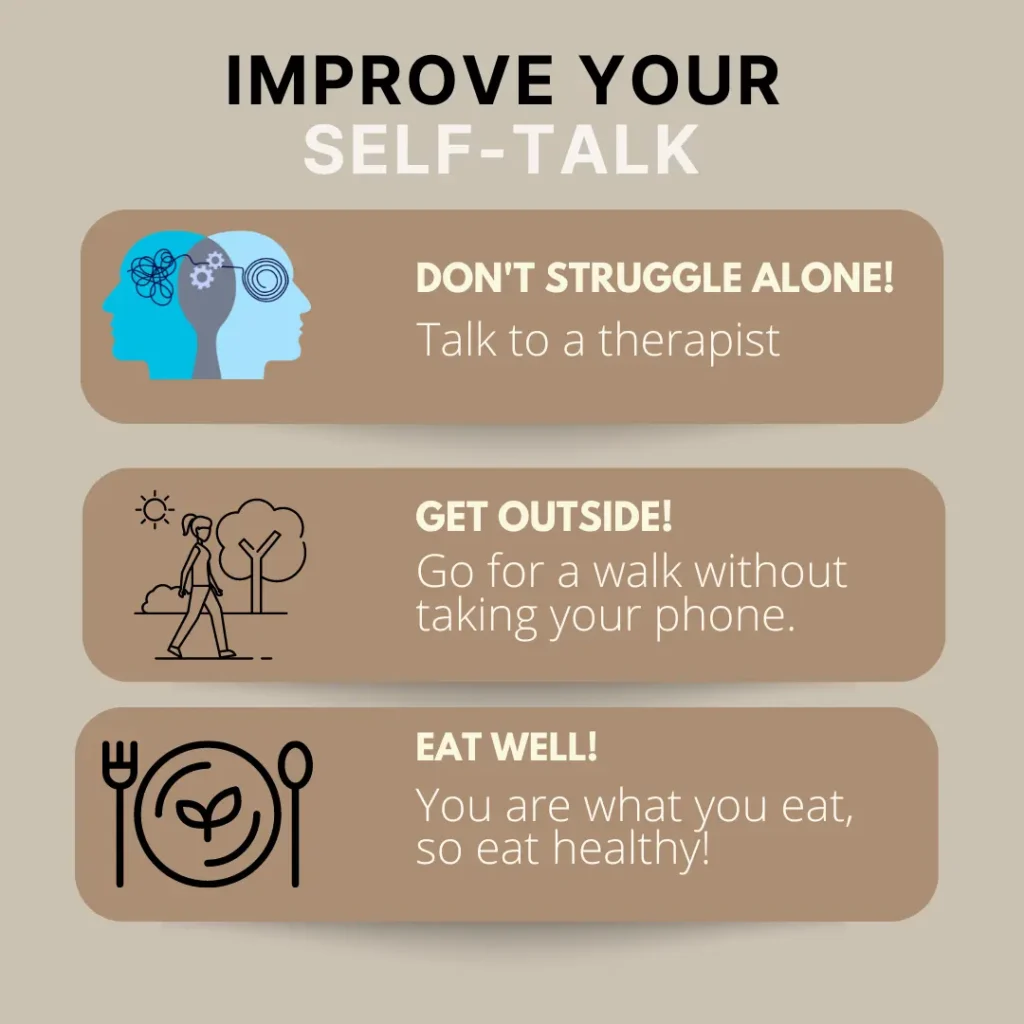Often, the most hurtful words are the ones we say to ourselves. Recognizing and removing negative self-talk is essential for our health. We usually think things like, “I’m not good enough,” or “I can’t do anything right.”
We all have negative emotions with us. But imagine changing those negative thoughts into positive ones. How amazing would that be? At one point in life, I hardly ever thought well of myself. I was constantly saying things like, “I’m such a F*Ck up” or “Jeez Bryan, that’s not worth a bucket of cold piss.”
However, I have learned to combat negative self-talk by replacing it with positive things. For example, “I am capable and strong; I can overcome any challenge” or “I am proud of myself for trying my best.” Challenging negative self-talk and improving self-esteem can be achieved by recognizing and acknowledging positive aspects of our lives.
It’s not like that was the case; in hindsight, I wasn’t doing too bad, but at that point in time, I didn’t have the skills needed to recognize these examples of negative self-talk, including perfectionism. It wasn’t until years later that I learned that I could change my outlook, how I viewed myself, and my thoughts. And I have been happier and more on an even keel ever since.
Key Takeaways
- Identify examples of negative self-talk and understand how they affect your mental health.
- Learn effective strategies for combating defeatist self-talk to enhance your emotional well-being.
- Implement transformative practices to stop negative self-talk.
- Gain insight into why replacing negative self-talk with positive internal dialogue leads to a healthier mindset.
- Explore the importance of recognizing self-criticism and initiating the change towards supportive self-talk.
Table of Contents
Examples of Negative Self-Talk”: Real-life Scenarios and Counteractions
Many people struggle with negative self-talk. It’s a silent force that can hold us back. By exposing the internal dialogue, we can fight it. In this section, we will show real-life examples of negative self-talk, including criticism from society and family members, and how it can lead to a skewed perspective of one’s personal flaws and failures stemming from various sources, such as societal influences and social media, ultimately fueling a desire for perfection. We will also provide counteractions and solutions to help improve how we see ourselves and our everyday lives.
- Scenario: You make a small mistake at work and think, “I always mess things up” or “I’m not good enough.” “I can’t do anything right.” Counteraction: Recognize this as negative self-talk. Reframe it with thoughts of your past wins. Say, “Everyone makes mistakes. I have succeeded before and can learn from this.”
- Scenario: After a social gathering, you focus on an awkward moment. You tell yourself, “I’m so socially awkward. No one likes being with me.” Counteraction: Fight these thoughts with memories of good social times. Change your view too, “I had an awkward moment, but that’s not my whole social life. I have friends who like being with me.”
- Scenario: You’re passed over for a promotion and instantly think, “I’m not good enough. I’ll never advance in my career.” Counteraction: See this negative view as just a momentary setback. Remind yourself, “This was just one chance. There will be more. I can learn and grow from this experience.”
Negative self-talk can twist our view of reality, making small setbacks seem huge and hiding our achievements. But by fighting back with positive counteractions, we can break these harmful patterns, promote personal growth, and reach our full potential. Remember, the goal isn’t to remove all negative thoughts. Instead, we aim to create a balanced inner dialogue that doesn’t lead to adverse emotions. This supports our happiness and growth, and positive self-talk is a powerful tool that can help us improve our overall well-being by finding healthier ways to think and speak to ourselves.
How does negative self talk impact one’s mental health?
Damaging self-talk can significantly impact mental health by creating feelings of self-doubt, worthlessness, and anxiety. Negative self-talk may lead to conditions like depression, stress, and anxiety, plus low self-regard. Over time, we become what we are thinking, affecting overall well-being and quality of life. I became where I was in a constant bad mood, which affected my work and friendships. So, the consequences of negative self-talk led to worsening mental health and fewer friends. And really, can you blame people for not wanting to be around someone who is in a constant negative state of mind?
Understanding the Impact of Negative Self-Talk
The words we say to ourselves can really shape our reality. These inner voices can change how we see our worth and skills. They can touch every choice and action we make, with big effects on our minds and how we connect with others.
- The repetitive nature of negative self-talk can become a detrimental cycle, fostering beliefs that diminish our self-worth and spark the onset of mental health challenges.
- Chronic self-criticism can act as kindling for conditions like depression and anxiety, as constant negativity undermines the individual’s outlook on life, leading to stress and emotional turmoil.
- It is important to understand the links between negative self-talk and low self-esteem in order to promote resilience against psychological distress.
| Aspect of Self-Talk | Impact on Self-Esteem | Consequences for Mental Health |
| Personalization of Failures | Lowered confidence in abilities | Increase in feelings of inadequacy and depression |
| Forecasting Negative Outcomes | Feelings of hopelessness | Rise in anxiety and emotional distress |
| Overgeneralization | Global negative self-assessment | Broader disruptions in social relationships and workplaces |
We can start changing our lives by being aware of and tackling these harmful patterns. Knowing about the impact of negative self-talk on mental health helps us work on a kinder inner voice. This voice encourages growth, resilience, and happiness.

Recognizing Different Types of Negative Self-Talk
We must proactively recognize and address negative self-talk to quiet our inner detractors. Once we become aware of it, we can take assertive steps to eliminate it and move forward with greater confidence. This voice can wear many masks, sometimes too subtle to notice. Yet, certain patterns reveal its harmful impact. You expose this inner enemy by identifying different forms of negative self-talk, including the little voice that belittles us. This allows you to challenge its truth and change how you treat yourself and see the world.
- Personalizing – You blame yourself for things that are out of your control. “If only I had done something differently, this wouldn’t have happened.”
- Catastrophizing – You see the worst in situations and expect disaster. “This is going to end terribly, I just know it.”
- Filtering – You focus only on the bad and ignore the good. “Sure, I did that well, but what about all these other things I got wrong?”
- Polarizing – You see things in black and white, no middle. “If it’s not perfect, it’s a total failure.”
- Overgeneralizing – You make wide guesses from one event. “I didn’t finish this task on time; I never do anything right.”
Recognizing these harmful patterns is a crucial first step toward change. Spotting when you’re stuck in negative self-talk helps you pause. This pause lets you question your inner voice and creates room for kinder self-stories to grow.
The way we talk to ourselves greatly affects our emotional and mental strength. Noticing the types of negative self-talk is the first key step to a gentler self-view and a hopeful mindset.
Noticing your internal negativity is empowering. By identifying the patterns that limit you, you can start to rewrite them. Recognizing them is your first step to changing your inner voice. This change paves the way for better mental health and positive self-talk.
Identifying the Origins of Negative Self-Talk
Understanding why we talk down to ourselves is like undoing a complex tapestry. It sheds light on why we keep putting ourselves down. Knowing where this negativity comes from is key to beating it.
Tracing Negative Self-Talk Back to Past Experiences
Our early life shapes how we talk to ourselves. Looking back, we see this negativity isn’t natural but learned. Childhood and key events leave lasting impacts on our self-dialogue. Realizing this link is a brave move toward healing.
The Role of Core Beliefs and Cognitive Distortions
Core beliefs are at the heart of our self-view. They’re our frame for seeing our actions. Negative beliefs twist our thoughts and make us more self-critical. Spotting these thought trends is vital.
| Cognitive Distortion | Description | Impact on Self-Talk |
| All-or-Nothing Thinking | Seeing things in black-and-white categories with no middle ground. | Enhances extreme forms of self-critique and unrealistic standards. |
| Overgeneralization | Taking a single bad event as a never-ending pattern of defeat. | Creates a loop of despair and hopelessness in self-dialogue. |
| Mental Filtering | Focusing solely on harmful aspects while filtering out the positive. | This leads to a skewed perception of events, undermining confidence. |
| Diminishing Positives | Downplaying positive experiences or attributes. | Promotes beliefs of inadequacy and minimizes achievements. |
| Jumping to Conclusions | Making negative interpretations without supporting evidence. | Encourages the internalization of fears and assumptions as truths. |
By digging into the roots of self-criticism, we learn how past experiences, core beliefs, and cognitive distortions feed our personal criticism. This understanding helps us change, fostering kinder self-talk.

Strategies to Interrupt Negativity
Stopping negative thoughts is key to breaking the cycle. There are many ways to interrupt defeatist thoughts, and they significantly impact your well-being. This empowers you to change the story you tell yourself. Engaging in thought exercises helps focus on the now, creating a break between thoughts and reactions.
Thought journaling involves writing down and examining negative thoughts. This can help identify negative thinking trends and provide an opportunity to challenge and reframe them. Cognitive restructuring and reframing are also useful in identifying and overcoming negative self-talk and replacing it with more positive and constructive thoughts.
These strategies involve checking if your thoughts are true and changing them into healthier, more constructive thoughts. If your self-talk significantly impacts your well-being, consider seeking professional help from a qualified mental health professional for personalized strategies and support.
- Engage in reflection exercises to be more aware of the present.
- Use thought journaling to notice and look for patterns.
- Try cognitive restructuring to challenge and change pessimistic beliefs.
- Practice cognitive reframing to see things in a brighter way.
Learn to combat negative self-talk and promote a positive mindset. We’ll discuss strategies for breaking negative belief patterns and achieving a happier, stronger mind.
| Strategy | Action | Outcome |
| Mindfulness Exercises | Regular practice of breathing techniques and meditation. | Increased self-awareness and reduced impulsivity in response to negative thoughts. |
| Thought Journaling | Daily logging of negative thoughts and the feelings they elicit. | Improved understanding of thinking and identification of triggers. |
| Cognitive Restructuring | Identifying irrational beliefs and challenging their accuracy. | Replaced distorted thoughts with more rational, balanced ones. |
| Cognitive Reframing | Shifting perspective to view situations in a more positive light. | Enhanced ability to handle stress and an overall increase in mental well-being. |
Making these strategies to interrupt negative thoughts part of daily life greatly helps our wellbeing. Actively doing this leads us from doubt to a narrative of hope and positivity.
From Self-Rejection to Self-Positivity
Creating kindness inside ourselves involves constantly moving from harsh criticism to gentle self-compassion. It consists in changing our inner talk to boost our strengths and calm our worries. This change is like growing a garden where we pull out self-doubt and plant encouraging words.
The Power of Positive Affirmations
Positive affirmations help these good thoughts grow. Saying things like “I am capable and strong,” or “I choose to treat myself with respect,” helps us see ourselves better. These phrases protect our hearts from negative thoughts and remind us that we are valuable every day.
“In the infinity of life where I am, all is perfect, whole, and complete.” – Louise Hay
Building a More Supportive Inner Voice
We must spot and challenge the doubting ones inside us to create a kind inner voice. Defeating these negative thoughts makes us stronger and more in control of our lives.
| Negative Thought | Supportive Counter | Outcome |
| “I can never do anything right.” | “I learn and grow from my experiences.” | Encourages growth mindset |
| “I’m not as good as others.” | “I am unique and my journey is my own.” | Promotes individuality and self-acceptance |
| “I shouldn’t have even tried.” | “Every attempt is a step towards success.” | Reinforces perseverance |
Using these methods every day protects us from harsh self-judgments. It builds a mind filled with support and kindness.

Practicing Mindfulness to Quell the Inner Critic
Practicing mindfulness every day can change how we deal with our inner critic. It helps us focus on the now. This stops us from dwelling on negative thoughts. These thoughts often criticize us.
Quieting the inner voices takes time and effort. It also needs easy methods that fit into daily life. Techniques like breathing exercises and meditation are key. They calm our minds and make us mentally strong.
Utilizing Breathing Exercises and Meditation
Breathing exercises help immensely. They can be done anywhere and give quick relief from harmful thoughts. The 4-7-8 method is simple but effective. You inhale for 4 seconds, hold it for 7 seconds, and exhale for 8. This can help calm anxious thoughts.
Meditation lets us explore our thoughts deeply. It teaches us to see our thoughts without being hard on ourselves. Guided meditations focus on kindness towards ourselves. Taking time for meditation every day helps us be more at peace with ourselves.
Making these practices a part of your day can really help control damaging thoughts. Try doing breathing exercises or meditation daily. See how it gradually changes the way you think about yourself. Start with just a moment to pause, breathe, and be in the moment.
Exercising Self-Compassion: The Antidote to Negative Self-Talk
Embracing self-empathy is a powerful way to change negative self-talk. By being kind to ourselves, we can gain comfort and understanding when we doubt our abilities. This approach can help us confront life’s challenges with kindness and positivity, boosting our self-esteem and improving our overall well-being.
- Self-Acceptance: Understand that no one is perfect. Allow yourself to make mistakes without harsh judgment.
- Self-Forgiveness: Let go of past mistakes. Holding onto regret stops us from being happy now.
- Self-care: Do things that are good for your body, mind, and emotions. This will build positive self-talk.
When you catch yourself thinking negative things, replace the negative. Spin it in a positive direction.
| Negative self talk examples | Self-Compassionate Response |
| “I always mess things up.” | “I had a setback, but I am learning and growing each day.” |
| “I can’t believe I did that; I’m so stupid.” | “I made a mistake, and that’s okay; I’m only human.” |
| “No one cares about what I have to say.” | “My voice is valuable, and I will find those who appreciate my thoughts.” |
Be kind to yourself with positive thinking. It fights negative self-talk and builds resilience, making you strong enough to tackle hard times. Commit to it for positive changes in your life.
The Role of Cognitive Behavioral Therapy in Reshaping Thought Patterns
Cognitive Behavioral Therapy (CBT) is key in reshaping thought patterns and challenging harmful thinking. It helps people see and change distorted thoughts that cause emotional trouble. Through a structured process, CBT aids in identifying harmful thoughts. It teaches questioning their truths and replacing them with helpful thoughts.
CBT focuses on the idea that our interpretations of events impact our mental well-being. It encourages looking closely at these thoughts. CBT techniques, like cognitive restructuring, assist in evaluating and changing negative thoughts into positive ones.
When to Seek Professional Help
Trying to fight cynical thinking on your own is admirable. Yet, knowing when to seek therapy is critical for your mental health. Sometimes, damaging thinking is too tough to handle alone. You might need more specialized methods and support.
If negative thoughts often overwhelm you, or if you struggle to manage them, consider seeking professional help. Pessimistic thinking that hurts your work, social life, or inner peace means it’s time for therapy. Don’t wait too long to get help. Acting fast is key.
Professional counseling can provide numerous benefits. Offering personalized care to your unique situation can provide you with new and effective ways to manage problems you may be facing. Additionally, it provides a safe and secure environment where you can talk about your feelings without fearing being judged. Mental health experts are trained to use various therapies that are tailored to meet your specific needs and goals. This can be immensely helpful in combating pessimistic thinking and improving your overall mental well-being.
Below is a table outlining the indicators that suggest when to seek counseling and the potential benefits of doing so:
| Indicators for Seeking Help | Benefits of Professional Counseling |
| Persistent negative thoughts that disrupt everyday life | A tailored approach to your specific mental health needs |
| Feelings of hopelessness or helplessness | Professional insight into underlying causes of negativity |
| Emotional distress influencing work or relationships | Strategies for coping and techniques to manage stress |
| Self-help methods prove insufficient | Continued support and guidance throughout the healing process |
| Use of negative coping mechanisms (e.g., substance abuse) | Access to resources and tools aimed at holistic recovery |
Getting professional help for better mental health is a sign of strength, not weakness. Whether deep or occasional, therapy can guide you away from negative thinking. Seeking therapy or counseling shows care for well-being and breaks mental health stigma. Beating negative self-talk requires intentional kindness and positivity to cultivate a healthier mindset. Recognizing the power of our thoughts empowers us to seek help when needed, whether from a therapist or a friend.
Many helpful thinking methods can help people overcome damaging thoughts and develop a more positive mindset. Seeking support from experts can further aid in this process. Change takes time and effort, but each small victory against negativity contributes to personal growth. Embracing a positive attitude is achievable for those willing to adjust their self-talk.
Source Links
- https://newsnetwork.mayoclinic.org/discussion/mayo-mindfulness-overcoming-negative-self-talk/
- https://footprintstorecovery.com/blog/combat-negative-self-talk/
- https://www.reddit.com/r/selfimprovement/comments/sex86z/how_do_i_stop_with_the_negative_self_talk/
20+ Years as a Special Education Teacher
NASM Certified Nutrition Coach,
Certified Trauma Informed Trainer
Mindset and Motivation Master Life Coach
